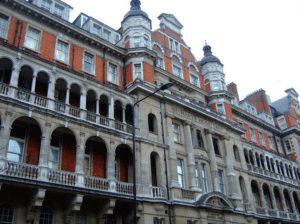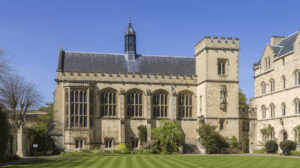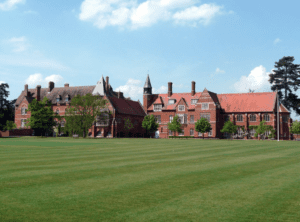Nicolas Roberto Robles
Badajoz, Spain
 |
| Figure 1. St. Mary’s Hospital, Paddington, London, UK. Photo by Enric likes Funk. 2008. Via Wikimedia. CC BY-SA 2.0. |
As a young man George Pickering was interested in his native Northumbrian countryside and intended to study agriculture. Persuaded later to read for a degree in biochemistry or physiology, he obtained a scholarship in basic sciences at Pembroke College, Cambridge, then decided to study medicine. He went to St. Thomas’s Hospital on a clinical fellowship and after qualification served there as a house physician. At the suggestion of Sir Joseph Barcroft he joined the department of Sir Thomas Lewis at University College Hospital in London and stayed there for eight years. He became interested in the control of the circulatory system, conducting studies of blood flow, and in 1938 with Prinzmetal rediscovered renin, which had originally been described by Tigerstedt and Bergman in 1898.
 |
| Figure 2. Oxford, Pembroke College. Photo by Andrew Shiva. 2014. Via Wikimedia. CC BY-SA 4.0. |
In October 1939, he was recruited by Sir Charles Wilson, later Lord Moran, to join the staff of St. Mary’s Hospital Medical School. He continued his research and was soon appointed head of the medical department. After the war ended, he returned to London and worked on many fields apart from hypertension, but his enduring fame will be in relation to high blood pressure. Together with his colleagues he studied the genetic and environmental factors determining the distribution of high blood pressure in populations, showing that there was no sharp differentiation between normotension and hypertension and that blood pressure, like many other qualities, was distributed as a continuous variable. This led to the now famous debate with Sir Robert Platt, who maintained that hypertension was an inherited disease with dominant type transmission. Pickering also showed that malignant hypertension was not a separate disease entity, but merely a severe phase of the disease.
In 1956 Pickering was appointed to the Regius Chair of Medicine at Oxford and proceeded to build up a department devoted to clinical research. In his popular book High Blood Pressure he reviewed the history of hypertension as well his own research. Together with his younger colleagues at Oxford, he pioneered devices for the continuous measurement of arterial pressure. These revealed the very large fluctuations of pressure which occur during normal daily activities.
 |
| Figure 3. Abingdon School, Abingdon, Oxfordshire. Photo by Reading Tom. 2011. Via Wikimedia. CC BY 2.0. |
On July 16, 1957, Pickering was knighted by Queen Elizabeth II at Buckingham Palace. He was Master of Pembroke College, Oxford, from 1968 to 1975 and Governor of Abingdon School from 1969 to 1974. He died from a stroke in 1980. He had himself long suffered from high blood pressure and his experience as a patient influenced his medical views. He remained to the end unconvinced that dietary salt restriction would be effective in reducing arterial pressure. In his treaty about high blood pressure, he wrote that the rigid low-sodium diet was insipid, unappetizing, monotonous, unacceptable, and intolerable. To stay on it, he maintained, required the asceticism of a religious zealot.1
In a medical meeting in 1980 he had commented that a low-salt diet might have had a place when there was no other effective treatment and it was a matter of life or death. He had found it very hard work to get his patients to eat as little sodium as Kempner employed with his rice diet. But his patients hated it and he learned that being on a low-salt diet was a terrible experience. It required them to buy special food, to carry it with them, they could not go to dinner or have people dine in their own house, and he concluded that such a diet deprived them of liberty and the pursuit of happiness.2 His friend and colleague J. I. S. Robertson recollects dining with him in a Paris restaurant just a few weeks before his death. Relishing the food and wine, he complained of a deficiency of garlic and called loudly for the saltshaker.3
References
- Antihypertensive Therapy: Principles and Practice. An International Symposium. F. Gross, S. R. Naegeli and A. H. Kirkwood (eds.) Berlin. Springer Verlag. 1966.
- Pickering G. The nature of essential hypertension. London: Churchill, 1961.
- Frontiers in Hypertension Research by John H. Laragh. John H. Laragh, Fritz R. Bühler, Donald W. Seldin (eds.) New York, Springer Verlag, 1981.
NICOLAS ROBERTO ROBLES is Professor of Nephrology at University of Extremadura and Member of the Academy of Medicine.
Fall 2021 | Sections | Nephrology & Hypertension

Leave a Reply